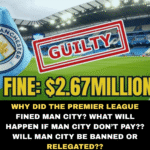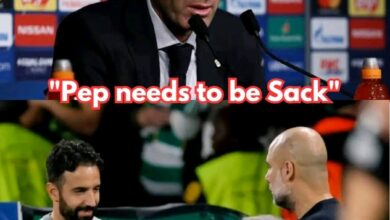Shock development in Man City 115 charges case as Premier League told to brace for ‘carnage’

In recent months, the case involving Manchester City and the 115 charges they face for breaching the Premier League’s financial rules has developed into one of the most significant and controversial issues in English football. The situation has attracted considerable attention, not just for the potential consequences for the club, but also for the broader implications it holds for the Premier League and its financial governance. This article explores the details of the case, the potential outcomes, and the impact the situation could have on the sport.
In February, the Premier League made an unprecedented move by accusing Manchester City of breaching its financial rules 115 times. The accusations were serious and related to the club’s financial dealings, with claims that they had overstated revenue, misled league authorities, and failed to comply with financial fair play regulations. This scandal sent shockwaves through the footballing world, as Manchester City had enjoyed significant success in recent years, winning multiple Premier League titles. The club, however, strongly denied the allegations, maintaining that they had done nothing wrong and that the charges were based on misunderstandings and misinterpretations of their financial activities.
The Premier League’s accusations were not the first time Manchester City had been involved in financial scrutiny. The club had faced similar charges from European football’s governing body, UEFA, in the past. UEFA had initially banned Manchester City from European competitions for two years in 2020 for breaching Financial Fair Play (FFP) regulations. However, the Court of Arbitration for Sport (CAS) overturned that decision, reducing the penalty to a fine. The UEFA case had raised questions about the club’s financial practices, but this new set of charges was far more extensive and, if proven, could result in more severe consequences.
The initial accusations of 115 breaches were made public in February 2025, causing a media frenzy and leading to widespread speculation about the potential consequences for the club. The Premier League’s charges were based on an investigation that spanned several years, during which the league examined Manchester City’s financial records, sponsorship deals, and related transactions. The league’s accusations painted a picture of a club that had systematically violated its rules to gain a financial advantage over its rivals, but City vehemently denied the charges, arguing that they had acted in good faith and in compliance with all applicable rules.
The case is now before an independent panel, with the official hearing having begun in September 2024. However, as of early 2025, no official verdict has been reached, and the situation remains in limbo. The uncertainty surrounding the case has created a tense atmosphere in the Premier League, with many clubs and stakeholders awaiting the outcome of the investigation. The decision of the independent panel is crucial, as it will determine whether Manchester City will face penalties and, if so, what those penalties might entail.
One of the key developments in the case came in early March 2025 when reports surfaced that Manchester City could be facing up to 130 charges, rather than the original 115. This increase in the number of charges has heightened concerns among Premier League officials, who are bracing for potentially devastating consequences. The additional charges, if proven, could have a far-reaching impact on the club, the Premier League, and English football as a whole.
The Premier League has yet to release a statement outlining the specific penalties that Manchester City could face if found guilty of the charges. The severity of the punishment is still unclear, but there are several potential outcomes that could result from the investigation. One of the most extreme possibilities is that Manchester City could be expelled from the Premier League entirely. Such a move would be unprecedented and would have significant implications for the club and the competition. However, expulsion is not a simple process and would require approval from the other Premier League clubs.
According to Rule B6 of the Premier League’s Handbook, expulsion can only occur if a special resolution is passed by a majority of the league’s clubs. Specifically, 15 out of the 20 clubs in the Premier League would need to vote in favor of expelling Manchester City from the competition. This requirement has led to debates about how likely such a decision would be, especially given the potential financial and competitive consequences. While some clubs might support the idea of expelling City, others may be less inclined to do so, as the decision would have far-reaching implications for the league’s financial landscape.
The possibility of expulsion has raised questions about the Premier League’s ability to enforce its rules and maintain financial integrity. If Manchester City were to be expelled, it would set a precedent that could have long-term consequences for other clubs in the league. It could also damage the Premier League’s reputation and raise questions about the effectiveness of its governance structures. However, even if expulsion is not on the table, there are other potential penalties that the club could face.
One of the most likely outcomes is that Manchester City could be hit with a hefty fine. The Premier League has previously imposed significant fines on clubs for financial misconduct, and a similar penalty could be applied in this case. However, the size of the fine would depend on the severity of the breaches and whether the independent panel believes that the club’s actions were deliberate or simply the result of mismanagement. Fines alone may not be enough to satisfy those who believe that Manchester City’s actions were damaging to the integrity of the competition.
In addition to financial penalties, Manchester City could face sporting sanctions. These could include points deductions, which would have a direct impact on the club’s performance in the Premier League. A points deduction could significantly alter the course of the competition, potentially allowing rival clubs to close the gap on Manchester City in the league standings. Points deductions have been used in the past in cases of financial misconduct, and it is a penalty that could be considered by the independent panel.
Another potential penalty is a ban from European competitions, although this is less likely given the outcome of Manchester City’s previous legal battle with UEFA. However, the independent panel could still decide to impose such a ban if it determines that the club’s financial breaches have undermined the integrity of the Premier League and European football. A European ban would be a severe blow to Manchester City, both financially and in terms of their prestige on the continental stage.
As the case continues to unfold, some Premier League officials have expressed concern about the potential consequences if Manchester City were to be acquitted of all charges. If the club were to win the case and prove that they had not breached any financial rules, it could lead to what one Premier League executive described as “carnage” within the competition. This executive warned that a victory for Manchester City could undermine the Premier League’s authority and weaken the financial fair play regulations that have been put in place to ensure that clubs operate within their means.
The executive raised the possibility that such an outcome could lead to a collapse of the Premier League’s financial governance framework. If Manchester City were to defeat the charges and avoid any penalties, it could send a message to other clubs that financial misconduct will not be punished, potentially encouraging further breaches of the rules. This would weaken the Premier League’s ability to maintain fair competition and could lead to a situation where the financial power of the richest clubs dominates the league, leaving smaller clubs with less financial security.
The potential collapse of the financial fair play system is a concern for many stakeholders in the Premier League, who see the regulations as crucial to maintaining a level playing field. Financial fair play was introduced by UEFA and adopted by the Premier League to ensure that clubs do not spend beyond their means and to prevent the rise of “financial doping,” where wealthy owners artificially inflate a club’s financial position through sponsorship deals or other financial arrangements. If Manchester City were to win the case and avoid penalties, it could undermine the credibility of financial fair play and lead to a situation where clubs can bend the rules without facing meaningful consequences.
The situation remains fluid, and the outcome of the case will have a significant impact on the future of both Manchester City and the Premier League as a whole. As the independent panel deliberates on the charges, it is clear that the case is far from over. The potential consequences of the decision could reshape the landscape of English football, with far-reaching effects on the competition, financial regulations, and the integrity of the sport. In the coming months, the Premier League, Manchester City, and the footballing world will be watching closely to see how the case is resolved and what the lasting impact will be on the game.
In conclusion, the case involving Manchester City and the 115 charges for breaching financial rules is one of the most significant legal and financial battles in the history of English football. The outcome of the case will have far-reaching implications for the club, the Premier League, and the future of financial governance in the sport. While the situation remains uncertain, the potential consequences are clear: the case could lead to major changes in how clubs are governed, how financial rules are enforced, and how the Premier League operates as a whole. The footballing world is waiting for the final verdict, and the stakes could not be higher.















